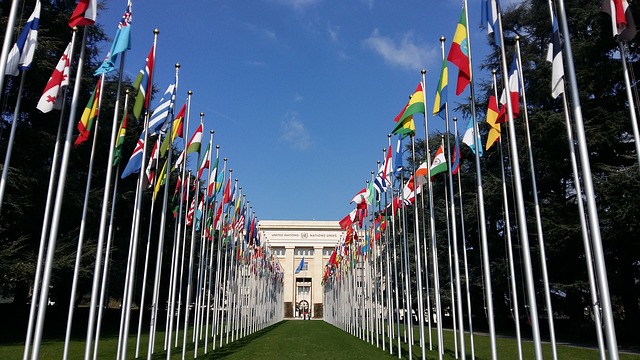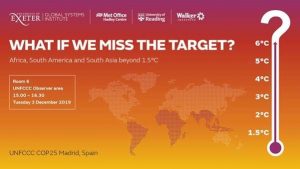UN climate change conference COP25 is underway in Madrid, and our climate scientists and students are there. Here we round up the University of Reading’s activities at the most significant annual event in the climate policy calendar.

2 – 13 December: COP CAS
This year the Walker Institute is running its COP CAS (COP Climate Action Studio) programme in conjunction with SCENARIO DTP which enables doctoral students to remotely engage and immerse themselves in COP. We have two PhD Students from biological sciences and environmental sciences on the ground for the full two weeks supporting COP CAS and our wider activities. Participating this year are 24 Reading students from a wide range of disciplines including archaeology, meteorology, Henley business school, geography and biological science – the biggest number of students to take part yet.
3 December, 15:00 – 16:30: What if we miss the target?

Together with Exeter University and the Met Office Hadley Centre, we are running a side event which will present the latest research findings on the impacts of global warming of 1.5°C, 2°C, and 4°C, at both global scales and in South America, Africa and South Asia. We will focus on changes in extreme weather and impacts on water availability, flooding, food insecurity and human heat stress together with the human/socio-economic dimension. What is the consensus around goals and what is needed to build this? Watch the live stream or catch it on demand later
Speakers:
Richard Betts (Met Office / University of Exeter)
Ros Cornforth (Walker Institute, University of Reading)
Lincoln Alves (National Institute for Space Research, Brazil)
Saiful Islam (Bangladesh University of Engineering and Technology)
Pauline Nantongo (EcoTrust)
Facilitator/Chair:
Valerie Masson-Delmotte (IPCC Author)
Week one: Exhibition stand
We will be hosting an exhibition stand in the first week of COP, providing a space for networking and dialogue with other observer organisations, party delegations and media participants whilst also showcasing the work Walker Institute and its wide network of researchers are carrying out around climate change. These exhibitions stands are a fundamental part of COP and where some of the inspirational discussions and new relationships begin.
Week two: Climate change impact on mountains
Walker Institute’s Grady Walker will be supporting the International Centre for Integrated Mountain Development (ICIMOD) during the second week of COP. This regional intergovernmental learning and knowledge sharing centre serving the eight regional member countries of the Hindu Kush Himalaya – Afghanistan, Bangladesh, Bhutan, China, India, Myanmar, Nepal, and Pakistan – and based in Kathmandu, Nepal. Globalization and climate change have an increasing influence on the stability of fragile mountain ecosystems and the livelihoods of mountain people. ICIMOD aims to assist mountain people to understand these changes, adapt to them, and make the most of new opportunities.
Week two: African Union support
Walker Institute is currently working closely with the African Union, to promote Africa’s growth and economic development by championing citizen inclusion and increased cooperation and integration of African states on a number of activities external to the COP process and will be supporting the African Union during the second week of the event. More details will follow as COP unfolds.
